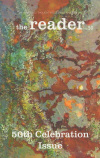The Reader – Summer 2013
Brian Nellist’s essay “People Don’t Read Scott Any More,” originally published in the Spring 1997 issue of The Reader, may have summed up a movement with an essential added value of literature: “the answer is experto crede, not ‘Trust the professional’, heaven forbid, but ‘have faith in the man who’s tried it.’” The idea represents a logical extension of trust in precedent—that we can look to literature as a forerunner to lives we haven’t lived and perhaps never will. We are all witnesses, but in a limited sense. Reading is the addenda to our lives. He adds at the end of the excerpt something else of vital importance to the enterprise of reading:
Brian Nellist’s essay “People Don’t Read Scott Any More,” originally published in the Spring 1997 issue of The Reader, may have summed up a movement with an essential added value of literature: “the answer is experto crede, not ‘Trust the professional’, heaven forbid, but ‘have faith in the man who’s tried it.’” The idea represents a logical extension of trust in precedent—that we can look to literature as a forerunner to lives we haven’t lived and perhaps never will. We are all witnesses, but in a limited sense. Reading is the addenda to our lives. He adds at the end of the excerpt something else of vital importance to the enterprise of reading:
The German psychologist Theodor Lipps thought that our pleasure in any object primarily offered to our senses lay in our identification with it, in its reconstitution in our own experience so that instead of two identities there is a single passionate blending . . . in English called ‘empathy.’
Nellist isn’t selling literature in any raw or blanket method; he is contemplating the enterprise of reading through the lens of Virginia Woolf’s To the Lighthouse.
The Reader, published in the U.K., which published out the article in its entirety in 1997 but revisited it for the special issue, is celebrating a 50th anniversary. It carefully includes historic pieces along with new efforts in a celebration of this kind of continuum. In reading it, we watch new ideas sparkle under the crystalline canon—contributors invoke Tolstoy, Wordsworth, Lessing, Milton, Augustine, Gaskill, Coleridge, Carver, and on and on to the sea that separates us. The ideas cross the ocean with a stunning virtuosity; it is a prized volume to be read again and again.
As an American outsider, I was, at times, lost without the benefit of certain contextual cues. For example, David Constantine’s memoir “Where I’m From” produces such magnificent ideas as a recollection of the trees of his childhood as: “[The trees] are to me, because of their blackness and when I think of their roots, like entrances to the underworld.” But the first sentence of the memoir slowed me down; I was lost on five references (two saints, two places, and a history) and had to go with the reader’s instinct that the light would be forthcoming. And it was. But the faith inspired me to want to know more about the publication’s origins.
The Reader Organisation, based in Liverpool, is an inventive approach to connect people and books. They call it “bringing about a reading revolution,” and the journal is a voice for that intent. The “reading revolution” offers research, writing, and community building through various applications of literature, ranging from potentially improving cognitive effects for individuals suffering from dementia to group readings. I won’t restate the website because I encourage you to visit it yourself, and I think that each well-designed and well-written page is worth careful consideration.
Note the weave of literature past and present, truly a continuum of ideas. For instance, Rowan Williams’ poem “Tolstoy at Astapovo” opens the volume with a fine twist on literary criticism and critique. You can feel the momentum that concludes the first stanza:
Ahead of [Tolstoy] strolls Platon,
not looking back: he runs till he is breathless,
burning, but he can’t catch him. In the next-door squares
the pieces crowd, the journalists, the relatives, the hopefuls,
the starets in the ladies’ loo, the script consultants,
Newsreel men, police. Check.
It glows on the page with a kind of phosphoric rhythm. Turn the page. He opens it up and it glows even more—the poem becomes a fistful of stars, each with its own intention. That is to say that the poet provides a guide and information for further thought about interpretation and intent. The system is ideal for the organization—I am not left behind, I am inducted into the world, and I appreciate the poem in a way that I otherwise might not have. The design of adding prose reflection following the poem itself ignites the spontaneous beauty—and my reading experience is enriched and expanded.
Take it sentence by sentence. The journal is magnificently rich and does not “dumb down” literary engagement. And for all the promise of reward, it delivers.
[thereader.org.uk]





